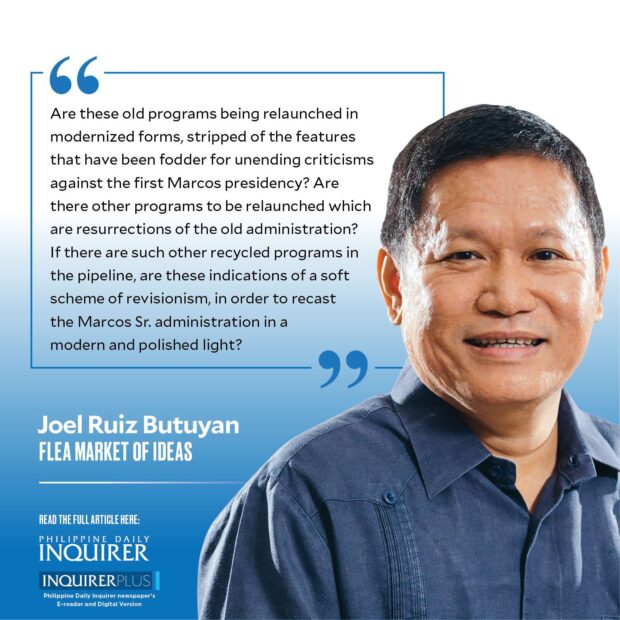Maharlika, Kadiwa, Masagana

In at least three flagship government programs, the Marcos administration has used labels that obviously evoke connections with the 20-year reign of his father, Ferdinand Marcos Sr. These are the Masagana rice program, Kadiwa stores, and the Maharlika Investment Fund (MIF).
The Masagana and Kadiwa programs were originally conceptualized by Marcos Sr. to help farmers and consumers, respectively. On the other hand, “maharlika” was a favorite brand word of the old man. Maharlika was the supposed anti-Japanese guerilla unit led by Marcos Sr. during World War II, a claim debunked by historians. Marcos Sr. also renamed to Maharlika the Pan-Philippine Highway which is our country’s transportation link from Luzon to Mindanao. Maharlika is likewise the name that Marcos Sr. attempted to adopt in replacement of “Philippines” as our country’s name.
What’s the intention behind the adoption of this series of labels that stir connections with the first Marcos presidency? Is it because President Marcos fervently believes that his father’s programs were excellent ones that need to be reinstated as solutions to our current problems? In other words, is this part of efforts to fulfill the promise of bringing back the “glory days” of the first Marcos administration?
Are these old programs being relaunched in modernized forms, stripped of the features that have been fodder for unending criticisms against the first Marcos presidency? Are there other programs to be relaunched which are resurrections of the old administration? If there are such other recycled programs in the pipeline, are these indications of a soft scheme of revisionism, in order to recast the Marcos Sr. administration in a modern and polished light?
The three-fold criticisms against a number of social and economic programs of the first Marcos presidency are the following: (1) they were palliative but ineffective solutions that wasted public funds, (2) their implementation were mismanaged resulting in worsened lives for the people, and/or (3) they were laden with corruption.
Those who praise the Kadiwa stores of the first Marcos presidency point to the food products sold at low prices by the mobile stores. Those who criticize point to the heavy burden on public funds caused by substantial government subsidy, as well as the token presence of the mobile stores compared to the sizeable number of consumers nationwide.
If there’s any bright side that we hear on the revival of the Kadiwa stores, it’s this talk on supporting farmers’ cooperatives and on creating direct links between food producers and end-consumers. But will all these verbiage translate into genuinely laudable implementation efforts? Or will this revived program end up again as palliative but ineffective effort?
Those who praise the Masagana rice program of the first Marcos presidency point to the farm machinery and farm inputs support given to farmers. Those who criticize the program point to the heavy loans that bankrupted both farmers and rural banks nationwide. Apart from declaring that the government will promote the use of high yielding rice varieties by farmers, the current Marcos administration has yet to spell out the full details of this revived program. If the current administration does not address the giant syndicates that manipulate palay prices, and the loan sharks that enslave farmers, no amount of tweaking will ever make a Masagana rice program succeed.
Those who support MIF point to our government’s need to raise money to fund public projects. Those who criticize point to the fund’s uselessness because our economy allegedly does not produce the kind of surplus capital appropriate for investments. For all intents and purposes, this supposed investment fund is no different from government loans, in the sense that both are intended to finance public projects. No matter how well-intentioned, however, any investment fund will suffer the same scourge as those borne by the behest loans of the old Marcos presidency, if the new Marcos administration fails to address corruption and mismanagement loopholes.
Is the new Marcos administration falling for the pitfalls of the old Marcos administration? Or will the old Marcos presidency benefit from absolution because of the reign of the new Marcos presidency?




















